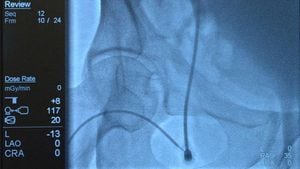‘More women must get recommended treatments after heart attack to save lives’
Charity calls for same options for both sexes to cut numbers of deaths.

Women must get the same treatment options as men after a heart attack to cut the number of female deaths, a charity has said.
Women are on average less likely than men to receive the recommended treatments after suffering a heart attack, research part-funded by the British Heart Foundation (BHF) suggests.
In terms of patients who die following a heart attack, the gap between the sexes “decreased dramatically” when women were given the same treatments offered to men, the charity said of the research published in the Journal of the American Heart Association.
Women who suffered a STEMI, the most serious form of heart attack, were more than a third less likely than their male counterparts to undergo bypass surgery or get stents, almost a quarter less likely to be given statins, and 16% less likely to be given aspirin, the BHF said.
The charity said: “Critically, when women received all of the treatments recommended for patients who have suffered a heart attack, the gap in excess mortality between the sexes decreased dramatically.”
A study was carried out by researchers at the University of Leeds and the Karolinska Institute in Sweden into 180,368 patients who suffered a heart attack in a 10-year period to 2013.
Professor Chris Gale, from the University of Leeds, who co-authored the study, said the typical view of a heart attack patient is not always correct.
He said: “We need to work harder to shift the perception that heart attacks only affect a certain type of person. Typically, when we think of a heart attack patient, we see a middle-aged man who is overweight, has diabetes and smokes.
“This is not always the case – heart attacks affect the wider spectrum of the population, including women.
“The findings from this study suggest that there are clear and simple ways to improve the outcomes of women who have a heart attack – we must ensure equal provision of evidence-based treatments for women.”
While the study focused on Sweden and showed a disparity, the situation in the UK could be worse, he added.
Professor Jeremy Pearson, associate medical director at the British Heart Foundation, said more women die from coronary heart disease than breast cancer in the UK.
He added: “The findings from this research are concerning – women are dying because they are not receiving proven treatments to save lives after a heart attack.
“We urgently need to raise awareness of this issue as it’s something that can be easily changed. By simply ensuring more women receive the recommended treatments, we’ll be able to help more families avoid the heartbreak of losing a loved one to heart disease.”





